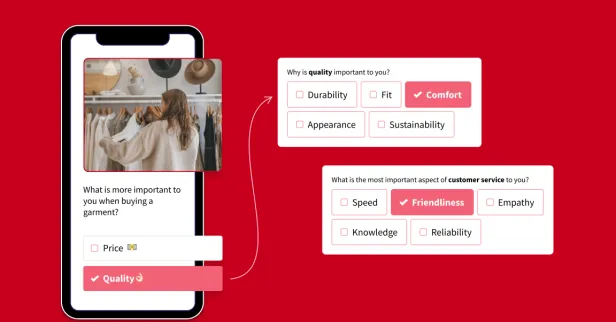Your packaging design is the first impression shoppers get of your product. So, it needs to be a good one.
A well-designed package is a powerful marketing tool that draws attention to your product on crowded shelves, bolsters brand recognition, and encourages purchases. In fact, 72% of Americans say that product packaging design influences their purchase decisions (Meyers)
Today, we'll walk through every aspect of package design testing, from the best times to test to the methods you can use.
What is Package Design Testing?
Before we dig into the nitty-gritty details, we'll cover the basics.
Package design testing involves evaluating different aspects of your product's packaging to determine its effectiveness in attracting and engaging shoppers. This process helps you identify which design elements work best, ensuring your packaging not only captures attention but also conveys the right message and meets market expectations.
When to Test Packaging Design
_Size=sm)_Color=Success.png) Test Early Packaging Concepts to Find the Right Direction
Test Early Packaging Concepts to Find the Right Direction
In the initial stages of product development, testing your early packaging concepts can help you identify the most promising design direction. This allows you to refine your ideas and focus on package designs that perform best with your target market.
Adjust and Perfect Your Go-to-Market Packaging
Once you're farther into your product development process and planning to go-to-market strategy, you'll want to test your final product packaging design. At this stage, you will fine-tune your designs to ensure your packaging is visually appealing, communicates the right messages, and stands out on a shelf.
Find Opportunities to Optimize Your Packaging During Re-Launches
A product update or re-launch is a fantastic time to reconsider your packaging design and identify areas for improvement. During this type of testing, you can evaluate new design elements and messaging strategies to keep your packaging fresh, relevant, and competitive.
Which Package Design Elements Should You Test?
Package Messaging and Claims
The copy you include on your product packaging is limited and important. In many cases, it's the first interaction a shopper has with your company's messaging. So, it's crucial that it aligns with your target buyer.
Kent Pet Group has a great story highlighting the power of the claims you include on your packaging.
Leading up to the launch of a new cat litter product, Kent Pet's team conducted a package claims test to validate their chosen concept before finalizing.
However, during their testing, they made an interesting discovery. The Kent Pet team knew that little "tracking" was a major annoyance for cat owners and a problem their product solved. So, they had included the claim in their packaging design.
But, they were surprised to learn that the claim "low dust" was JUST as important to their target audience. With a quick adjustment to their packaging, they ended up having the strongest product launch in the company's history.
Package Colors
Color plays a significant role in attracting attention, molding perceptions, and conveying brand identity. Despite being studied by psychologists for decades, many overlook the power of color when designing their packaging.
For example, suppose you want to align your product with sustainability, nature, adventure, and eco-friendliness. In that case, you'd want to consider colors like Green, Brown, and Orange.
Or, if you were launching a product that you wanted to be seen as bold, youthful, warm, and fun, you would consider colors like yellow or red.
Ultimately, you'll have to test different color schemes to see which combinations appeal to your unique audience.
Graphics and Imagery
Evaluate the impact of various graphics and imagery on your packaging. Ensure that the visuals are attractive, relevant, and aligned with your product's message and target audience.
Size and Shape
Test different packaging sizes to determine the most practical and appealing option. Consider factors such as shelf space, consumer convenience, and perceived value when evaluating size options.
Package Design Testing Metrics
1. Packaging Appeal
Measure how attractive and eye-catching your packaging design is to consumers. High appeal can significantly influence a consumer's decision to pick up your product.
2. Purchase Intent
Assess the likelihood that consumers will purchase your product based on its packaging. Strong purchase intent indicates that your design effectively communicates value and desirability.
3. Design Uniqueness
Evaluate how distinctive and unique your packaging design is compared to competitors. A unique design can help your product stand out and attract more attention.
4. Quality Conveyed
Test how well your packaging design conveys a sense of quality. Consumers often associate high-quality packaging with high-quality products.
5. Market Relevance
Ensure that your packaging design is relevant to your target market. It should resonate with consumer preferences and align with current market trends.
Methods for Testing Your Packaging Design
Concept Testing
Conduct surveys or focus groups to gather feedback on different packaging concepts. This method helps you understand consumer preferences and identify the most promising design directions.
Heatmapping
Use heat mapping tools to analyze where consumers' eyes are drawn to your packaging. This method helps you identify your design's most and least noticed elements, allowing you to optimize visual hierarchy.
Focus Groups
Organize focus groups to obtain detailed, qualitative feedback on your packaging design. Engaging directly with consumers can provide valuable insights into their perceptions and preferences.
Package Design Testing with SightX
SightX is an AI-driven platform that makes package design testing a breeze thanks to Generative AI. While powerful enough for teams at Fortune 500 companies, our user-friendly interface makes it simple for anyone to start, optimize, and scale their own concept testing research.
With our Generative AI consultant, Ada, you can harness the power GPT to build concept tests in seconds. And once your data is collected, Ada will analyze, summarize and report on your findings, picking out key insights in seconds and making recommendations on ways to apply the feedback to your concepts.
Curious? Let us show you how simple it can be to collect powerful feedback on your packaging designs.
